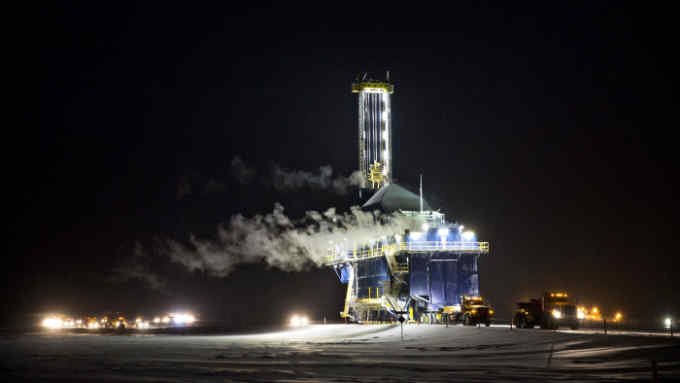US and EU sanctions take toll on Russian oil and gas exploration

Simply sign up to the Oil & Gas industry myFT Digest -- delivered directly to your inbox.
International co-operation is proving to be increasingly important for technological development in the oil and gas industry and nothing makes that more obvious than restrictions on collaboration.
Russia, one of the world’s top producers along with US and Saudi Arabia, has felt the effect of a ban on co-operation first-hand since the US and EU introduced sanctions against its energy sector in 2014, with the US continually expanding the restrictions, most recently in September.
Sanctions specifically target access to foreign capital as well as Arctic offshore, deepwater and shale projects.
They forced ExxonMobil to suspend its partnership with Rosneft at the Pobeda field in the Russian Arctic, and Italy’s Eni has blown hot and cold over its offshore collaboration with Rosneft on Black Sea projects. Royal Dutch Shell, meanwhile, had to give up its partnership with Gazprom Neft on the Bazhenov formation in western Siberia.
While such troubled projects are only a small part of Russia’s oil output, their development becomes more important as traditional oilfields dry up, says Artem Frolov, vice-president at Moody’s, the rating agency, in Moscow.
“Russian oil companies lack their own technologies to develop shale and Arctic fields and have effectively put such projects on hold following foreign oil majors pulling [out] from the respective joint ventures,” he says.
“Although domestic oil producers are pursuing import substitution strategies through in-house research and development centres, the development of commercially feasible technologies and fully localised production of the required equipment will likely take years,” he adds.
Besides sanctions, the rouble devaluation after the severe oil price drop in 2014 has made foreign technology less accessible for local companies.
Russia has continued to set post-Soviet oil production records but officials fear a decline of up to 40 per cent over the next 15 years if no efficient technological solutions are introduced, Russia’s energy ministry warns.
“Most hard-to-recover reserves are not subject to the sanctions and Russian companies continue to rely on western technology and firms like Schlumberger or Halliburton to develop them,” says Dmitry Marinchenko, an oil and gas analyst at Fitch Ratings in London.
Schlumberger, one of the world’s biggest oil services groups, has developed production at its eight plants in Russia and has opened a scientific technological centre in the country. Many Russian companies have also accelerated the development of in-house technical services.
Most hard-to-extract projects continue to involve foreign partners, although in the past few years there has been a shift to the east and south, away from western partners.
A consortium of Indian companies holds nearly a half stake in Vankor, one of Rosneft’s key producing assets.
Gazprom Neft has reportedly been in talks with Chinese companies to develop the Chona project in eastern Siberia. It has also signed an agreement on technological co-operation with China’s CNPC on techniques to improve oil recovery.
The company is also working with UAE’s Mubadala on technical competencies and with Shell on the Salym Petroleum joint venture. IBM supplies it with knowhow.
“I don’t understand how we can use the words ‘state border’ when talking of the oil industry. Besides, the speed of spreading knowledge these days is very high, it is impossible to hide anything. It is collaboration that we focus on primarily. Most of our projects are done in partnership, be it with Shell, Mubadala, or technical providers,” says Alexei Vashkevich, head of technology development at Gazprom Neft.
“Today, sanctions are very selective and they are manageable. Yes, without them, something would have been done faster because we would be able to attract help from foreign colleagues,” he says.
Unlike the oil industry, however, Russia’s gas industry has always been perceived as having little reliance on foreign partnerships in upstream production. But while Russia has sufficient, and even exportable, skills in onshore gas production, it is the offshore projects that struggle from lack of foreign help.
Gazprom, the country’s gas giant, has struggled to find technology for its South Kirinskoye offshore field in the Far East after the project became a specific target of US sanctions, essentially banning any US company from supplying subsea equipment.
Development of the Arctic offshore Shtokman field is also on hold and will be perhaps for decades, dragged down by a combination of sanctions, the emergence of the US as a gas exporter and weaker global gas prices after the oil price crash of 2014.
Further development of liquefied natural gas projects is particularly vulnerable as Russia lacks most knowhow, including large-scale commercial liquefaction technology.
LNG has been the most rapidly growing area in the Russian hydrocarbons industry, with the launch of Yamal LNG plant in the Arctic and plans for at least one more near by, in addition to Sakahlin 2 LNG plant, in operation since 2009.
Russia is open about its ambition to become a global LNG producer, expecting to produce up to 140m tonnes of LNG, double the volume produced today in Qatar, an LNG behemoth.
To achieve that, however, it still relies on foreign technology. The forthcoming Arctic LNG 2 plant by Novatek and its French, Chinese and Japanese partners, for instance, has agreed to import solutions from TechnipFMC, a Franco-American services company.
“Like any other high-tech industry, oil and gas is becoming increasingly international,” says Mr Marinchenko of Fitch. “Many new technologies . . . are initially developed and tested in the US, where the environment is more competitive and companies enjoy better access to capital and less regulation.”

Comments